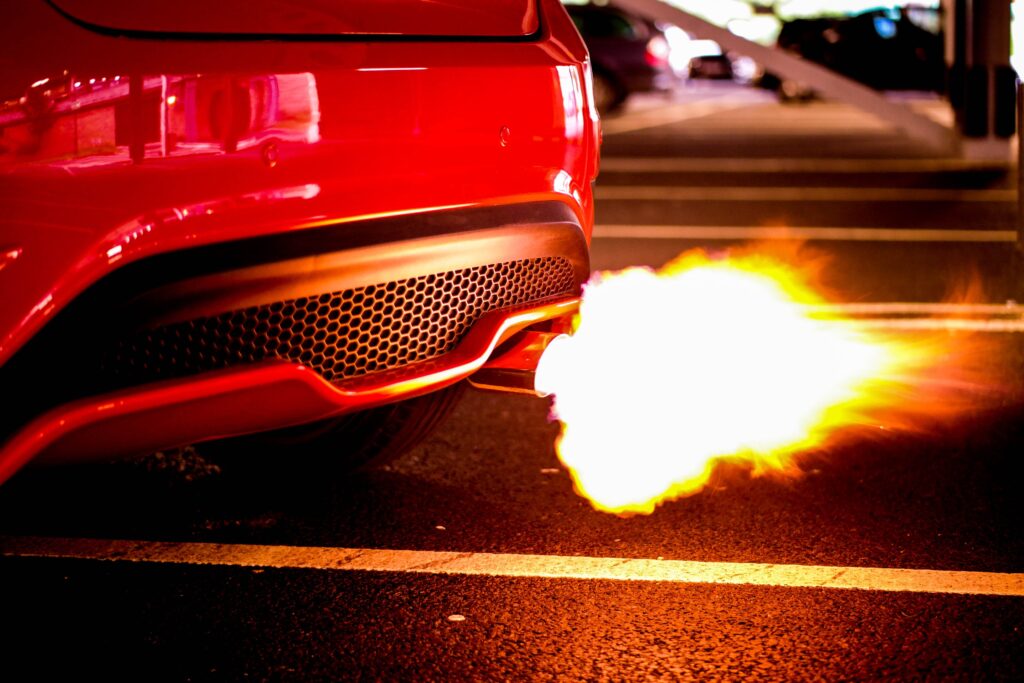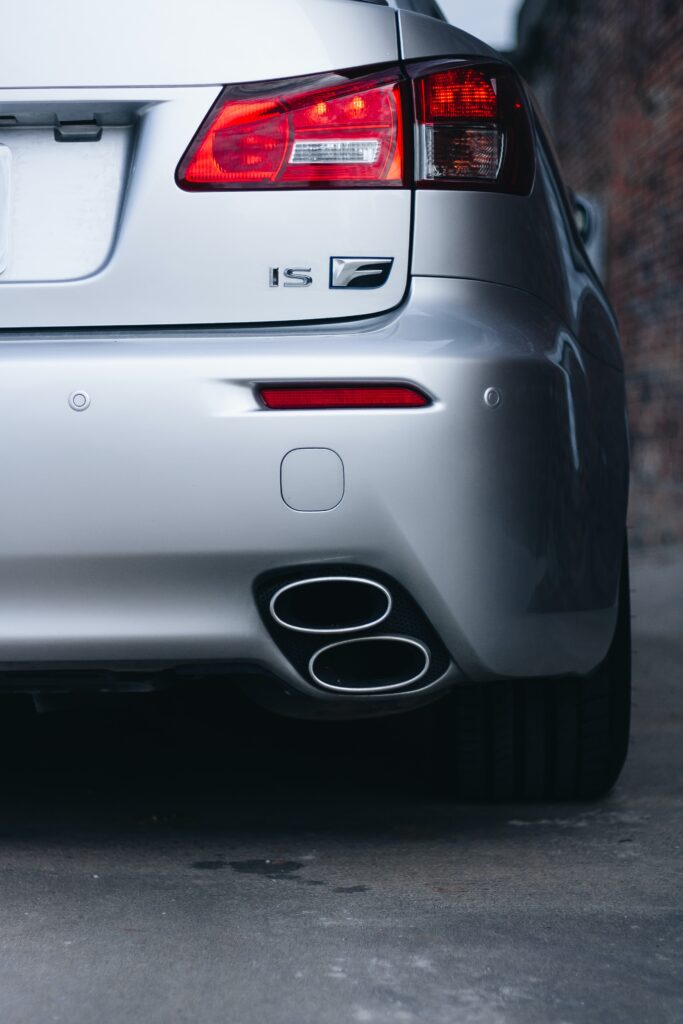Have you ever wondered why your exhaust system is making that strange whistling sound? It can be quite puzzling, but fear not, as we delve into the possible causes and solutions for this common automotive issue. From a simple loose connection to a more serious exhaust leak, we’ll explore the various reasons behind the whistle and guide you towards a quieter and smoother ride. So, if you’re tired of the eerie sound coming from your vehicle’s exhaust, let’s uncover the mystery together and get your exhaust system back to its normal, non-whistling self.

Understanding Your Car’s Exhaust System
The role and function of the exhaust system
The exhaust system in your car plays a crucial role in the overall operation and performance of your vehicle. Its primary function is to remove the harmful gases produced during the combustion process and safely direct them out of the vehicle. Without a properly functioning exhaust system, your car’s engine could suffer from reduced performance, increased fuel consumption, and even potential damage.
Key components of the exhaust system
To better understand why your exhaust system may be whistling, it’s essential to know its key components. The exhaust system consists of the exhaust manifold, catalytic converter, muffler, and tailpipe. The exhaust manifold collects the gases produced by the engine cylinders and directs them to the catalytic converter, where harmful pollutants are converted into less harmful emissions. The muffler helps to reduce noise produced by the engine, and the tailpipe releases the final exhaust gases out into the atmosphere.
How the exhaust system affects vehicle performance
A well-functioning exhaust system is essential for maintaining your vehicle’s performance and fuel efficiency. The exhaust system helps maintain proper engine back pressure, which affects engine combustion and power. If the exhaust system is compromised, such as through leaks or damaged components, it can disrupt this back pressure and lead to reduced engine performance. It may also cause your vehicle to consume more fuel than usual due to a less efficient combustion process.
Possible Reasons for Exhaust System Whistling
The concept of resonance and airflow in the exhaust system
One possible reason for your exhaust system whistling is due to the concept of resonance. Resonance occurs when sound waves bounce back and forth between two surfaces, creating a harmonious or amplified effect. In the context of an exhaust system, when there is a disruption in airflow or a change in exhaust pipe diameter or shape, it can create conditions where sound waves resonate and produce a whistling sound.
Impact of external and environmental factors
External and environmental factors can also contribute to your exhaust system whistling. For example, if your vehicle encounters strong winds while driving, the airflow around the exhaust system can change, leading to a whistling sound. Additionally, debris or dirt lodged in the exhaust pipe or muffler can disrupt the smooth flow of exhaust gases and create unusual sounds.
Potential mechanical failures causing the whistle
Mechanical failures within the exhaust system can also lead to a whistling sound. These failures can include damaged or corroded exhaust pipes, loose connections, or faulty mufflers. When any of these components are not functioning correctly, it can result in abnormal airflow patterns and cause the exhaust gases to create a whistling noise as they pass through the damaged or faulty parts.

Exhaust Leaks and Noises
How exhaust leaks cause whistling
Exhaust leaks are a common culprit behind a whistling exhaust system. These leaks can occur at various points along the exhaust system, such as the connections between pipes or where the exhaust manifold meets the engine. When there is a leak, it disrupts the proper flow of exhaust gases, causing changes in pressure and airflow. These disruptions can create whistling or hissing sounds as the escaping gases pass through the small openings.
Identifying signs of a potential exhaust leak
Detecting an exhaust leak early on is essential to prevent further damage and potential safety risks. Some common signs of a potential exhaust leak include a whistling or hissing sound coming from the exhaust system, a decrease in fuel efficiency, a noticeable smell of exhaust fumes inside the vehicle, or vibrations or rumbling under the car. If you experience any of these signs, it’s crucial to have your exhaust system inspected by a qualified mechanic as soon as possible.
The dangers of an exhaust leak
Driving with an exhaust leak can not only be annoying due to the whistling sound but also pose serious health and safety risks. The gases released through an exhaust leak, such as carbon monoxide, can be harmful if inhaled in high concentrations. Carbon monoxide is colorless and odorless, making it difficult to detect without proper equipment. prolonged exposure to exhaust gases can lead to dizziness, nausea, and even carbon monoxide poisoning. Therefore, it’s crucial to address any exhaust leaks promptly to ensure the safety of both the vehicle occupants and other drivers on the road.
Faulty Exhaust Manifold Gaskets
Understanding the purpose of an exhaust manifold gasket
The exhaust manifold gasket serves a critical role in the exhaust system by creating a seal between the exhaust manifold and the engine’s cylinder head. This seal prevents exhaust gases from leaking out and ensures that all gases flow through the designated path. Without a functioning exhaust manifold gasket, the exhaust system’s efficiency can be compromised, leading to whistling sounds and potential engine problems.
Signs of a faulty exhaust manifold gasket
When the exhaust manifold gasket starts to fail, it can result in a variety of symptoms, including a whistling sound coming from the engine or exhaust, decreased engine performance, a noticeable smell of exhaust fumes in the vehicle, or visible signs of a leak, such as black soot around the exhaust manifold. If you suspect a faulty exhaust manifold gasket, it’s crucial to have it inspected and replaced by a professional to prevent further damage to the exhaust system.
How faulty exhaust manifold gaskets can cause whistling
When the exhaust manifold gasket has become worn or damaged, it can create small gaps or openings that allow exhaust gases to escape prematurely. These escaping gases can disrupt the smooth flow of exhaust and lead to changes in pressure, resulting in a whistling sound. Replacing a faulty exhaust manifold gasket is essential to restore proper functionality to the exhaust system and prevent whistling noises.

Damages or Issues with Muffler and Exhaust Pipes
Regular wear and tear on muffler and exhaust pipes
Over time, the muffler and exhaust pipes in your vehicle can experience wear and tear due to exposure to high temperatures, corrosive gases, and road debris. This wear and tear can lead to cracks, holes, or other damages in the muffler and pipes, ultimately resulting in whistling noises.
How damages to these parts lead to whistling noises
When the muffler or exhaust pipes become damaged, the smooth flow of exhaust gases is interrupted. The escaping gases can create unusual patterns of airflow, resulting in changes in pressure and the production of a whistling sound. If left unattended, these damaged parts can worsen, jeopardizing the overall performance of your exhaust system and potentially leading to more significant repair costs down the line.
Methods of inspecting for damages
Inspecting your muffler and exhaust pipes regularly can help detect any damages early on and prevent them from worsening. Some signs of damage to look out for include visible holes or cracks, rust or corrosion, loose connections between components, or excessive noise coming from the exhaust system. If you notice any of these signs, it’s crucial to have your vehicle inspected by a qualified mechanic to determine the extent of the damage and recommend appropriate repairs or replacements.
Issues with the Exhaust Valve
The role of the exhaust valve in the system
The exhaust valve is a crucial component within the exhaust system that regulates the timing and release of exhaust gases from the engine cylinders. It opens and closes at specific intervals to ensure that exhaust gases are expelled efficiently. If the exhaust valve is not functioning correctly, it can disrupt the exhaust flow and lead to whistling noises.
How a malfunctioning exhaust valve can lead to whistling
When an exhaust valve becomes worn, damaged, or stuck, it may not open or close properly. This malfunction can disrupt the smooth flow of exhaust gases and cause changes in pressure, resulting in a whistling sound. Additionally, if the valve is not opening or closing at the appropriate times, it can affect engine performance and efficiency.
Signs of a problematic exhaust valve
Some signs that may indicate a problematic exhaust valve include a whistling sound coming from the engine or exhaust, decreased engine power or acceleration, engine misfires or rough idling, or visible signs of oil or carbon deposits around the valve. If you suspect an issue with your exhaust valve, it’s essential to have it inspected and repaired by a professional to prevent further damage and potential engine problems.
The Impact of Unfiltered Air Flow
The importance of proper air filtration in the exhaust system
Proper air filtration is crucial for maintaining the efficiency and performance of your vehicle’s exhaust system. The exhaust gases produced by the engine contain harmful pollutants and particulate matter that need to be filtered out before being released into the environment. Without effective air filtration, these pollutants can contribute to air pollution and potentially harm human health.
How unfiltered air flow causes whistling
When the air filtration system within your exhaust system becomes clogged or obstructed, it can create changes in pressure and disrupt the smooth flow of exhaust gases. This disruption can lead to an imbalanced airflow and result in whistling noises. Regular maintenance and cleaning of the air filtration components, such as the catalytic converter and particulate filters, are vital to prevent unfiltered air flow and keep your exhaust system operating efficiently.
Maintenance tips for optimum air filtration
To ensure optimum air filtration in your exhaust system, it’s essential to follow proper maintenance practices. Regularly inspect and replace air filters according to the manufacturer’s recommendations. Keep the air intake area free from debris and clean any build-up or residue on the air filtration components. Additionally, avoid using low-quality or improper air filters, as they may not provide adequate filtration and can contribute to whistling noises and other exhaust system issues.
Preventive Measures to Avoid Exhaust Whistling
Routine maintenance and inspections
One of the most effective ways to prevent exhaust whistling is by implementing routine maintenance and inspections of your car’s exhaust system. Regularly check for any signs of damage, leaks, or abnormalities and have them addressed promptly by a qualified mechanic. Additionally, follow the manufacturer’s recommended maintenance schedule for your specific vehicle to ensure that all components of the exhaust system are functioning optimally.
Driving habits that minimize wear and tear
Your driving habits can also play a role in minimizing wear and tear on your exhaust system and reducing the likelihood of whistling noises. Avoid excessive idling for extended periods as it can increase the temperature of the exhaust system and put additional stress on the components. Additionally, try to avoid driving over rough terrain or roads with significant potholes or speed bumps, as this can cause unnecessary vibrations and potential damage to the exhaust system.
Importance of timely repairs and part replacements
Lastly, timely repairs and part replacements are crucial to prevent further damage and costly repairs. When you notice any signs of exhaust whistling or other abnormalities, don’t delay in having your vehicle inspected by a qualified mechanic. Ignoring the issue or attempting quick fixes can worsen the problem and potentially lead to more significant damage and safety hazards. Trusting a professional to diagnose and repair any exhaust system issues promptly is the best way to maintain the performance and integrity of your vehicle.
